Mucous mem - Study guides, Class notes & Summaries
Looking for the best study guides, study notes and summaries about Mucous mem? On this page you'll find 90 study documents about Mucous mem.
Page 2 out of 90 results
Sort by
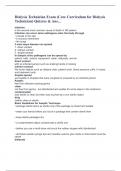
-
Dialysis Technician Exam (Core Curriculum for Dialysis Technician) Quizzes & Ans… infection is the second most common cause of death in HD patient Infection can occur when pathogens enter the body through • a break in the skin • a mucous membrane • the l
- Exam (elaborations) • 4 pages • 2024
-
- $10.49
- + learn more
Dialysis Technician Exam (Core Curriculum for Dialysis Technician) Quizzes & Ans… infection is the second most common cause of death in HD patient Infection can occur when pathogens enter the body through • a break in the skin • a mucous membrane • the lungs 3 main ways disease can spread 1. direct contact 2. indirect contact 3. droplet spread In dialysis clinic pathogens can be spread by patient, bath, visitors, equipment, water, dialysate, and air direct contact with an...
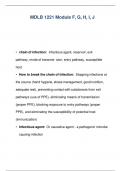
-
Mdlb 1221 questions with complete Answers
- Exam (elaborations) • 35 pages • 2024
-
- $12.49
- + learn more
MDLB 1221 Module F, G, H, I, J • chain of infection: infectious agent, reservoir, exit pathway, mode of transmis- sion, entry pathway, susceptible host • How to break the chain of infection: Stopping infections at the source (hand hygiene, stress management, good nutrition, adequate rest), preventing contact with substances from exit pathways (use of PPE), eliminating means of transmission (proper PPE), blocking exposure to entry pathways (proper PPE), and eliminating the susceptibi...
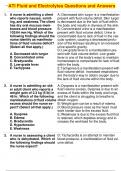
-
ATI Fluid and Electrolytes Questions and Answers
- Exam (elaborations) • 10 pages • 2024
-
- $10.49
- + learn more
ATI Fluid and Electrolytes Questions and Answers 1. A nurse is admitting a client who reports nausea, vomit- ing, and weakness. The client has dry oral mucous mem- branes and blood pressure 102/64 mm Hg. Which of the following findings should the nurse identify as manifesta- tions of fluid volume deficit? (Select all that apply.) A. Decreased skin turgor B. Concentrated urine C. Bradycardia D. Low-grade fever E. Tachypnea 2. A nurse is admitting an old- er adult client who repor...

-
ATI COMPRENSIVE EXIT EXAM WITH CORRECT ANSWERS ACTUAL EXAM 100% 20232024
- Exam (elaborations) • 23 pages • 2023
-
- $21.49
- + learn more
ATI COMPRENSIVE EXIT EXAM WITH CORRECT ANSWERS ACTUAL EXAM 100% 20232024 A home health nurse is caring for a child who has Lyme disease. Which of the following is an appropriate action for the nurse to take? - CORRECT ANSWER-Ensure the state health department has been notified. A nurse is caring for a client who has a vented NG tube set to low intermittent suction and has vomited. Which of the following actions should the nurse perform first? - CORRECT ANSWER-Evaluate function...
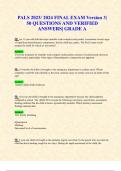
-
PALS 2023/ 2024 FINAL EXAM Version 3| 50 ACTUAL QUESTIONS AND VERIFIED ANSWERS| GRADE A
- Exam (elaborations) • 12 pages • 2023
-
Available in package deal
-
- $10.49
- + learn more
PALS 2023/ 2024 FINAL EXAM Version 3| 50 ACTUAL QUESTIONS AND VERIFIED ANSWERS| GRADE A Q: An 11-year-old child develops unstable wide-complex tachycardia. Assessment reveals signs of significant hemodynamic compromise, but the child has a pulse. The PALS team would prepare the child for which in- tervention? Answer: First-line treatment for unstable wide-complex tachycardias consists of synchronized electrical cardioversion, particularly when signs of hemodynamic compromise are apparent...
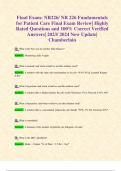
-
Final Exam: NR226/ NR 226 Fundamentals for Patient Care Final Exam Review| Highly Rated Questions and 100% Correct Verified Answers| 2023/ 2024 New Update| Chamberlain
- Exam (elaborations) • 48 pages • 2023
-
Available in package deal
-
- $11.89
- + learn more
Final Exam: NR226/ NR 226 Fundamentals for Patient Care Final Exam Review| Highly Rated Questions and 100% Correct Verified Answers| 2023/ 2024 New Update| Chamberlain Q: What is the best way to monitor fluid balance? Answer: Monitoring daily weight Q: What is isotonic and when would we see this solution used? Answer: A solution with the same salt concentration as in cells *0.9% NS & Lactated Ringers (LR)* Q: What is hypotonic and when would we see this solution used? ...
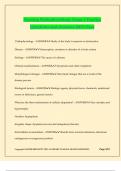
-
Nursing Pathophysiology Exam 1 Practice Questions and Answers 100% Pass
- Exam (elaborations) • 15 pages • 2024
-
- $12.49
- + learn more
Nursing Pathophysiology Exam 1 Practice Questions and Answers 100% Pass Pathophysiology - ANSWER-Study of the body's response to dysfunction Disease - ANSWER-Interruption, cessation or disorder of a body system Etiology - ANSWER-The cause of a disease Clinical manifestations - ANSWER-Symptoms and chief complaints Morphological changes - ANSWER-Structural changes that are a result of the disease process Etiological factors - ANSWER-Biologic agents, physical forces, chemicals, nutrition...
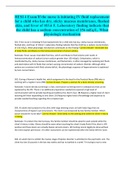
-
HESI 4 Exam/If the nurse is initiating IV fluid replacement for a child who has dry, sticky mucous membranes, flushed skin, and fever of 103.6 F. Laboratory finding indicate that the child has a sodium concentration of 156 mEq/L. What physiologic mech
- Exam (elaborations) • 23 pages • 2022
-
- $17.99
- + learn more
301. If the nurse is initiating IV fluid replacement for a child who has dry, sticky mucous membranes, flushed skin, and fever of 103.6 F. Laboratory finding indicate that the child has a sodium concentration of 156 mEq/L. What physiologic mechanism contributes to this finding? Correct Answer- Insensible loss of body fluids contributes to the hemoconcentration of serum solutes. Rationale: Fever causes insensible fluid loss, which contribute to fluid volume and results in hemoconcentrati...
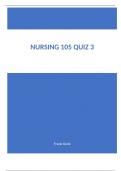
-
ciliated mucous membrane in nose.
- Exam (elaborations) • 15 pages • 2024
- Available in package deal
-
- $13.99
- + learn more
ciliated mucous membrane in nose.
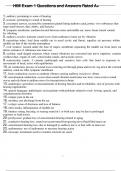
-
HIM Exam 1 Questions and Answers Rated A+
- Exam (elaborations) • 7 pages • 2024
-
Available in package deal
-
- $12.99
- + learn more
HIM Exam 1 Questions and Answers Rated A+ 1. auditory: pertaining to sense of hearing 2. acoustic: pertaining to sound of hearing 3. cercumen: earwax, secreted by ceruminous glands lining auditory canal, protec- tive substances that traps small insects, dust, debris, and bacteria 4. tympanic membrane: eardrum located between outer and middle ear, mem- brane transit sounds by vibrating 5. auditory ossicles: transmit sound waves from eardrum to inner ear by vibration 6. eustachian tubes: ...

How did he do that? By selling his study resources on Stuvia. Try it yourself! Discover all about earning on Stuvia


